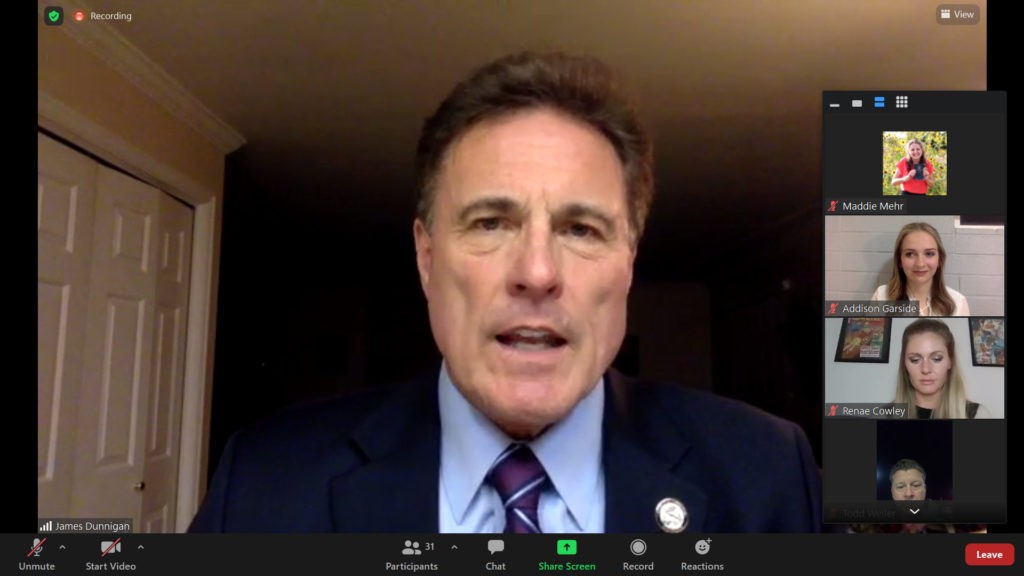
A Utah state senator, a Utah state representative, and a Utah cowgirl-turned-lobbyist shared their how-tos for getting involved in politics with the BYU Pre-Law Student Association Thursday, Nov. 19.
Sen. Todd Weiler, a Republican from Woods Cross; Rep. Jim Dunnigan, a Republican from Taylorsville; and Foxley & Pignanelli lobbyist Renae Cowley spoke to students over Zoom, giving them practical advice about building relationships with legislators, getting legislation sponsored and building a political career.
Cowley, who competes as a barrel racer when she isn’t working in the legislature, said if students want to build relationships with their lawmakers, they should volunteer for a campaign. “There is a level of credibility that comes with those who are in the trenches,” she said.
Cowley said her experience working on Mike Lee’s campaign as a Utah State University student gave her the needed clout to move forward in her political career, even though her job consisted mainly of answering tedious emails and angry phone calls.
“I just put my head down, and I worked really hard. I answered all the info@mikelee inquiries,” Cowley said. Even though the other students she worked with were impressive law students and pre-law students, Cowley said her diligence and humility made her stand out.
Dunnigan said when interacting with legislators, it is important to build relationships of trust. “Don’t feel a need to threaten a legislator,” he said. “I think you get a lot more progress trying to work with them, getting them information and telling them what your interests are.”

Dunnigan said a lot of people try to make political change through angry phone calls and emails. “That doesn’t move me.”
Weiler said relationships of trust are also important when trying to pass legislation and work with those on the other side of the political aisle. He also said despite sensational stories in the press, the majority of bills passed in the legislature receive bipartisan support.
“If you read the Salt Lake Tribune, you’d think that we’re constantly at each other’s throats,” Weiler said. “People are surprised at how much bipartisanship works gets done. Ninety percent or so of all of our bills are unanimous or nearly unanimous.”
Weiler said he’s been surprised at how often the American Civil Liberties Union, which he sees as leaning politically left, teams up with Libertas, a libertarian organization, to support bills. And while occasionally the legislature reviews a bill on a hot topic like abortion, Weiler said most potential laws are “pothole bills,” things that simply need to get done.
“If you have a pothole, and it needs to be filled, it doesn’t really matter whether a Republican fills it or a Democrat fills it. The only important thing is the pothole gets filled. A lot of our bills at the Capitol are just things that need to get done, and it doesn’t really matter if you’re Republican or Democrat,” Weiler said.
“The Republican and Democrat legislators — we honestly like each other. We’re friends, we know each other’s spouses, we celebrate each other’s weddings and mourn with (each other’s) funerals, and we really are kind of a big family up at the Capitol,” Weiler said.
Dunnigan said other ways students can connect with their legislators are to do homework on the issues and bring a constituent of the legislator when going to meet with them about a specific issue.
Cowley agreed and said that for legislators, constituents are more powerful than lobbyists. “A group of well-organized citizens will trump me any day of the week, and it’s happened several times,” she said.
When asked how she climbed the ladder of success, Cowley said, “Personality, chutzpah, hard work and mentorship.” She said people with personalities who know and use their personal brands are often successful. Cowley has used her own brand of being a “sassy cowgirl from Northern Utah,” to stand out in her field.
Weiler told students not to wait to get politically active. “If you wait for your turn in politics, it’s never going to be your turn,” he said. “Don’t wait for your turn.”




